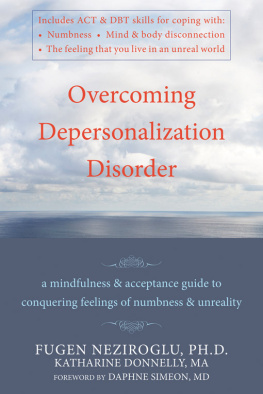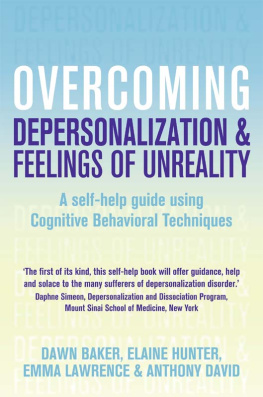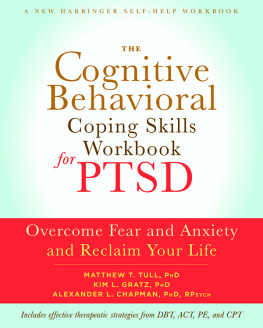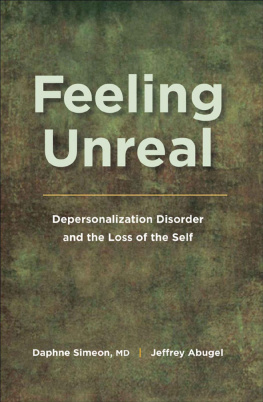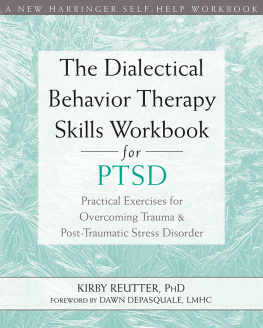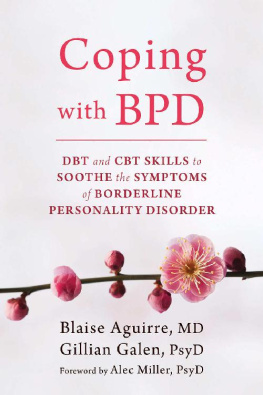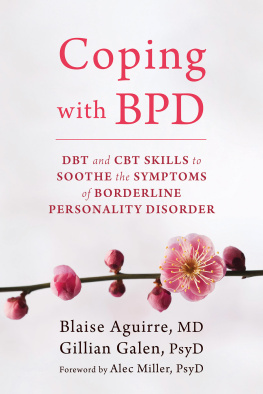Fugen Neziroglu, Ph.D., ABBP, ABPP, is a board-certified cognitive and behavior psychologist involved in the research and treatment of anxiety disorders, obsessive-compulsive spectrum disorders, trichotillomania, hoarding, body dysmorphic disorder, and hypochondriasis at the Bio Behavioral Institute in Great Neck, NY. She is coauthor of Overcoming Compulsive Hoarding and many other books. Her books have been translated to various languages.
Katharine Donnelly, MA, is a behavior therapist at the Bio Behavioral Institute in Great Neck, NY. Her areas of interest include behavioral and acceptance-oriented therapies and obsessive-compulsive spectrum behaviors.
Foreword writer Daphne Simeon, MD, is associate professor of psychiatry at the Albert Einstein College of Medicine in New York City. She is director of the depersonalization and dissociation program at the Beth Israel Medical Center in New York.
A bold, yet wise approach to the core problems of depersonalization. This scientifically sound combination of acceptance and behavioral approaches can fundamentally change the life direction of people struggling with this debilitating disorder. Highly recommended.
Steven C. Hayes, Ph.D., Foundation Professor of Psychology at the University of Nevada and author of Get Out of Your Mind and Into Your Life

Publishers Note
Care has been taken to confirm the accuracy of the information presented and to describe generally accepted practices. However, the authors, editors, and publisher are not responsible for errors or omissions or for any consequences from application of the information in this book and make no warranty, express or implied, with respect to the contents of the publication.
The authors, editors, and publisher have exerted every effort to ensure that any drug selection and dosage set forth in this text are in accordance with current recommendations and practice at the time of publication. However, in view of ongoing research, changes in government regulations, and the constant flow of information relating to drug therapy and drug reactions, the reader is urged to check the package insert for each drug for any change in indications and dosage and for added warnings and precautions. This is particularly important when the recommended agent is a new or infrequently employed drug.
Some drugs and medical devices presented in this publication may have Food and Drug Administration (FDA) clearance for limited use in restricted research settings. It is the responsibility of the health care provider to ascertain the FDA status of each drug or device planned for use in their clinical practice.
Distributed in Canada by Raincoast Books
Copyright 2010 by Fugen Neziroglu & Katharine Donnelly
New Harbinger Publications, Inc.
5674 Shattuck Avenue
Oakland, CA 94609
www.newharbinger.com
All Rights Reserved
Epub ISBN: 9781608820429
Acquired by Catharine Sutker; Cover design by Amy Shoup;
Edited by Nelda Street; Text design by Tracy Marie Carlson
The Library of Congress has Cataloged the Print Edition as:
Neziroglu, Fugen A., 1951
Overcoming depersonalization disorder : a mindfulness and acceptance guide to conquering feelings of numbness and unreality / Fugen Neziroglu and Katharine Donnelly ; foreword by Daphne Simeon.
p. cm.
Includes bibliographical references.
ISBN 978-1-57224-706-2
1. Depersonalization. I. Donnelly, Katherine Fair. II. Title.
RC553.D4N49 2010
616.89142--dc22
2010009307
Contents
Foreword
Overcoming Depersonalization Disorder, by Fugen Neziroglu, Katharine Donnelly, and Jose Yaryura-Tobias, is a very welcome addition to the scant book literature on depersonalization disorder. Although the disorder is estimated to afflict up to 2 percent of people over the course of their lifetimes, it remains underdiagnosed and frequently misdiagnosed, leaving its sufferers increasingly frustrated and hopeless as they go from one mental health professional to the next looking for an accurate diagnosis, effective treatment, and hope for the future. Even when the disorder is accurately diagnosed, many clinicians remain at a loss as to how to best treat these patients, since the treatment guidelines for chronic depersonalization continue to be obscure compared to those for many other psychiatric disorders. This new book, happily, offers a wealth of psychological treatment approaches that can ultimately prove helpful to many people afflicted by the disorder.
The book is highly readable, targeting a lay audience as well as clinicians looking for informed help in treating their patients. In the first three chapters, the book introduces all the intricate aspects of the condition, including its symptoms; its course over time; its common antecedents, such as trauma and family dysfunction; and, importantly, its overlap with and its differences from related psychiatric disorders. This book also covers some basic neurobiology in order to give the reader a solid sense of what we know about the biological underpinnings of the disorder.
The bulk of the book is dedicated to a wide variety of psychotherapy approaches that can be used to tackle chronic depersonalization. Its unique contribution is the fact that it draws from both acceptance and commitment therapy and dialectical behavior therapy, and specifically applies both of these models to the treatment of depersonalization. The authors describe in simple and clear ways, illustrated by many examples, how self-focus and obsessional preoccupation with the illness often brings more suffering, while a mental stance based on mindfulness in the moment and on acceptance as a contextual background to the work of change can alleviate pain and suffering. The book describes thoughts, feelings, and avoidance behaviors that stem from the condition and exacerbate it, with an emphasis on enhancing the persons growth potential and commitment to valued aspects of life even in the face of very distressing symptoms.
The authors then introduce basic principles of dialectical behavior therapy as they apply to chronic depersonalization: present-moment mindfulness, distress tolerance, awareness and regulation of emotions, and interpersonal effectiveness. These are supplemented with classic behavioral approaches focusing on exposure and response prevention, targeting not only the symptoms of depersonalization but also its historical precipitants and its most feared outcomes. The book ends with some additional treatment options such as cognitive approaches, general wellness strategies, and an overview of pharmacological treatment options.
This is a comprehensive, up-to-date, highly readable, and user-friendly book. It offers many vignettes and examples, exercises and worksheets, helpful concluding summaries to each chapter, and a question-and-answer section addressing some of the most frequently expressed concerns of people with depersonalization disorder. It is a very welcome addition to a newly emerging field, and one that patients and clinicians alike will find very helpful.
Daphne Simeon, MD author of Feeling Unreal: Depersonalization Disorder and the Loss of Self Associate Professor of Psychiatry Beth Israel Medical Center and Albert Einstein College of Medicine New York
Acknowledgments
This book was inspired by our work with a few people who moved us with their overwhelming suffering and ultimate resilience. Depersonalization disorder (DPD) is one of many psychological conditions that dont fit comfortably into one category. Depersonalization might describe an obsessive-compulsive process, a symptom of somatization or hypochondriasis, an extension of panic disorder or post-traumatic stress disorder, an extreme of depression, or really any other form of extreme suffering. However, DPD might instead manifest as numbness, fogginess, social alienation, or similar complaints. Because DPD tends to mess with your very sense of self and awareness, its one of the more disturbing of the somatization/anxiety disorders. We would especially like to acknowledge those of you with DPD for sharing the stories of your struggles, the stories that pepper this book.

